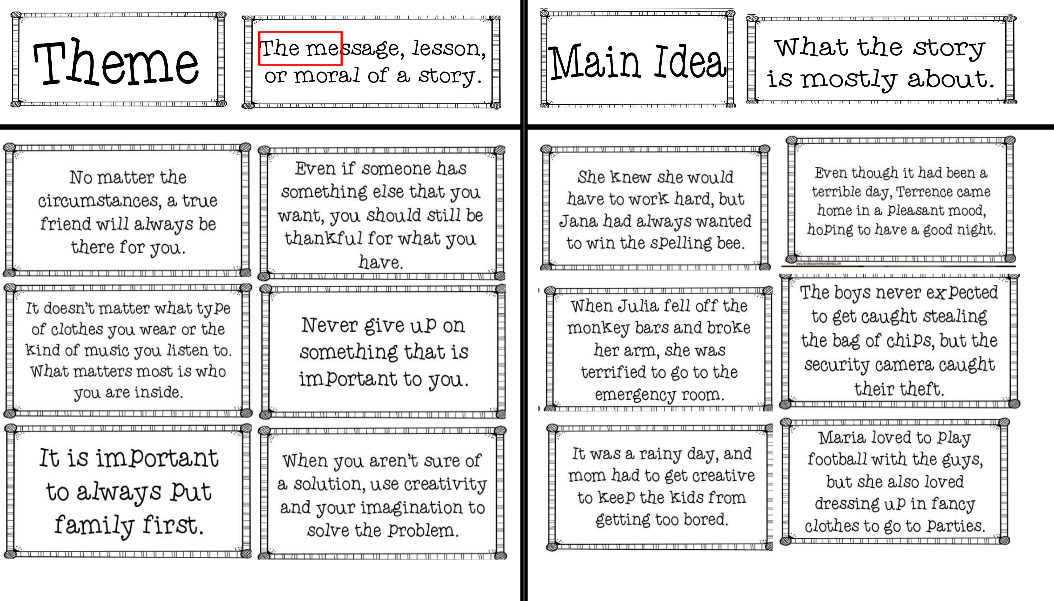Here we go! Watch the trailer then be ready to listen to Chapter One. I'm so so So excited to read this book with you. As I've been telling you all fall, this book was my ABSOLUTE VERY FAVORITE read of the summer :0).
Wednesday, November 19, 2014
Endangered by Eliot Schreffer Book Trailer
Sunday, November 16, 2014
Building Background Collaborative Research for Endangered by Eliot Schrefer
Let's get ready to read Endangered by Eliot Schrefer! You will each help us research by gathering information and creating a slide that will give our group background about the Congo, bonobos, and the people who help to bring awareness about them.
Sunday, November 9, 2014
Theme
The theme of a story is the moral message or lesson of a story.
THE MESSAGE
The Main Idea of a story tells what it is mostly about.
(One Sentence Summary)
Below is our anchor chart that illustrates the difference.
Thursday, November 6, 2014
Red Herring
Red Herring
- A red herring is used in mysteries and thriller stories to distract the reader from identifying the real culprit.
- The red herring in a story can take the form of characters that the reader suspect, but who turn out be innocent when the real murderer is identified.
- It aims at keeping the readers guessing at the possibilities until the end and therefore keeps them interested in the story.
- The readers enjoy solving the mysteries created by red herrings in the story. Undoubtedly, it would be difficult to keep the reader’s interest, if we knew which way the plot would go from the start.
One for the Murphy's isn't a mystery or a thriller, but the author does use red herring to hook her reader.
- Do you think Carley will stay with the Murphys or go back to live with her mother?
- What text evidence does the author use to lead you to a conclusion?
Sunday, November 2, 2014
Symbolism
SYMBOLISM
Symbolism is giving special meaning to objects, things, relationships or events.
Symbols are objects, things, places, characters, figures, events, sounds or colors used to represent abstract ideas or concepts. A symbol is the physical representation of a concept or an idea.
Symbolic Significance is the meaning or understanding beyond symbols.
What do we need to know so we can have a better Understanding of Symbolism?
- Symbols are tangible (touchable) objects that represent intangible (untouchable) ideas.
- Something that is tangible is concrete. Something that is intangible is abstract.
- Nouns are people, places, objects, and things which are concrete—physical.
- Nouns are also concepts and ideas which are abstract—not physical.
- Symbols are concrete or literal items that represent abstract or symbolic ideas.
|
Symbol
|
Symbolic Significance or Meaning
What it Represents
|
Conflict
CONFLICT
The plot of almost any story centers on conflict. A conflict is a struggle between opposing forces.
There are two main kinds of conflict: external and internal.
External Conflict
|
When a character faces an outside force this is known as external conflict. During the course of a story, characters may face numerous types of outside forces. The outside force may be another character, or a group of people promoting their beliefs, or even be the forces of nature (storm, plague, drought).
Man against Man
Man against Nature
Man against Society
Man against the Supernatural
Man against Technology
Man against the Unknown
Internal Conflict
A struggle that takes place in a character’s mind is called an internal conflict. They character has to make a moral decision—to choose between what is considered right and what is considered wrong. Sometimes a character has to make a choice where there are two equally unlikeable solutions but the choice has to be made. When a character experiences these emotions and feelings and must come to a decision on one’s own, he or she is experiencing an internal conflict.
Man against Himself
The Importance of Conflict
Without conflict there is no story!
Discovering Conflict while Reading
1. Identify the main characters—protagonist, antagonist
2. Decide what the complication or major conflict(s) are
3. Look for steps the protagonist takes to resolve the conflict
4. Are there many minor or subsequent conflicts?
5. Watch for foreshadowing clues and try to predict what the characters will do
6. Enjoy the buildup of tension and suspense
7. Has the main character failed or succeeded?
8. Is the conflict finally resolved?
|
|
Saturday, November 1, 2014
Showing Appreciation for Our Veterans
Veterans Day is soon approaching. It is an important day reserved for remembering, honoring, and showing gratitude to our nation's veterans. A veteran is a person who has served honorably on active duty in the armed forces of the United States.
Below are videos that warmed my heart. Watch one or watch them all.
Below is a short video about the history of Veterans Day:
On Friday, November 7, our school will have a program led by our music teacher, Mrs. Winger, to honor veterans in our community. Many of our 5th graders are singing, and all of them are creating a card that will be given to a guest veteran showing our gratitude for their service. Big jobs! How do we even begin to say thank you for the gifts they have given to us?
What are you feeling after watching them?
What would you like to tell a veteran?
In what ways could you thank our veterans?
After watching the videos, create a card showing your appreciation for our veterans.
Subscribe to:
Comments (Atom)
